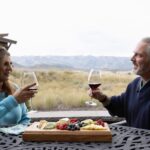As you get older, your goals may change, but your healthy habits don’t have to.
– Dr. Rob Sinnott –

This year, I turned 57.
One of the things I’m most proud of: I’m the same weight as I was in high school. I have the same strength as I did as a state-champion wrestler in high school. I wear the same size jeans as I did in high school.
And I feel better than I did in high school.
It hasn’t always been this way, as I’ve gone through ups and downs, struggles, health scares, and heavy-stress periods in my life that got me off track. But I attribute my current state of health to a holistic approach to wellness—taking care of myself physically, with good nutritional choices, and mentally (which go a long way in helping you feel ready to take on the challenges of life).
But you know what’s different?
I don’t have the same goals as I did in high school. Back then, it was all about looking good in the mirror and performing well in sports.
Now, it’s about living life. It’s about having energy to do what I love, and it’s about taking care of myself so I can be present for my family. It’s also about having a body that prepares me to enjoy all of life’s adventures that are there for the taking.
And I plan to take them and take them and take them for a long, long time.
My exercise strategy—something that is close to my heart, because I love working out—comes down to a very simple approach. I have three activities I really like, and I try to do one of them every day. Best of all, they benefit my body in different ways. For me, I focus on weight training (good for muscular strength), cycling (good for my heart and muscles), and gardening (a light physical activity that also has mental and spiritual benefits). Another benefit is that I can share these activities with my wife and sons and friends so it has the benefit of helping build strong relationships.
As we get older, we care less and less about “mirror muscles.” We care more about how we can help our body function better. After all, exercise helps reduce the risk of losing muscle mass, called sarcopenia, which is a natural part of the degenerative and aging process. It’s very common in older, sedentary adults. That’s what leads to fragility in the body, and it can be a contributor to balance and falling issues.
So yes, am I proud I wear the same size jeans as I did in high school and look good in them? Yes! I sure am, but how I feel everyday–better energy, better sleep, fewer health challenges than I had a decade ago–that’s the real motivator for me.
I care mostly that I’m doing what I can every day to better my odds that I will get to wear those jeans for many, many years to come.
—-
Stay tuned for our video podcast, which will come out early next year, for much more about exercise.

A Truly Super Food
I’ve spent much of my career looking at—and fascinated by—places called the Blue Zones. Those locations, as you may know, are the ones where the populations have health and longevity levels that don’t just rank as better than average. They’re more in the “wow, that’s mighty impressive” category.
I have visited Japan for several decades, and it’s one of my favorite places in the world. The traditional diet there is one that includes many of the foods that you see in Blue Zones, such as the emphasis on seafood with very little emphasis on other animal protein (the culture has shifted over time, and you do see many more Western-style fast-food restaurants now than you used to).
There’s so much to unpack and talk about when it comes to Blue Zones (and I will in future newsletters), but the one I want to highlight today is the one that’s found in the Blue Zone of Okinawa, Japan. There, because of tropical storms and downpours, it’s difficult to grow rice, a staple food in Japan.
Instead, they grow imo, which may sound like a character in a Pixar movie but is actually a blue sweet potato that’s rich in minerals like potassium, as well as disease-fighting antioxidants. Plus, they’re loaded with healthy fiber and carbs for energy (whereas rice is more heavily carbs only, rather than fiber-rich).
That cool fact about a blue sweet potato isn’t just a reminder that sweet potatoes are a great food. It also reminds you that so much of the battle about health, wellness, and longevity is fought not just on your plate, but at the store, where you first make decisions about what foods are best for your body.
We get many hints about making the most of our wellness through the Blue Zones, where nutrient-rich seafood, vegetables, and fruits are the star players—and the Americanized staples of saturated fat, fried foods, and processed junk are cut from the team.

Something is Always Better Than Nothing
The health-advice industry, let’s face it, is a noisy one. Between the Instagram influencers, the bombardment of ads for flatten-your-belly devices, and the constant barrage of information that comes at us with the speed of darts, it can be a difficult world to navigate.
For anyone who’s struggling with their health or maybe just starting out on a new journey, the wellness world can feel more daunting than a 1,000-piece all-white jigsaw puzzle.
Let’s stop over-engineering our health journeys with intricate instructions, impossible-to-follow rules, and standards that few people can meet.
Let’s start simple.
One of things I tell people who ask for advice and feel frustrated with their health and their bodies: Something is better than nothing.
That is, don’t let an all-or-nothing mindset be your guiding principle. I see it all the time—someone wants to be “all in” on a program or diet and then the minute they deviate, they give up, because they think they failed.
Instead, just plug away little by little—and know that every step forward, no matter how big or small, is just that: movement forward.
The first few weeks on any program may feel really tough (change usually does). You may feel tired, frustrated, even dejected. But just do something.
Don’t have the oomph to do your regularly scheduled workout? Do a shorter workout or something a little less intense. Really don’t want to fight the traffic to go to the gym? Walk around the block a few times. Raining outside and a walk is just going to make you feel like a big bowl of sloppy soup? Do a few squats or pushups or march in place in your living room.
Anything—even if it feels small—is better than a super-set of beer and nachos day after day.
Perfection is not the goal. Developing habits that you can build upon is.

What Works for You? At the Peak of Health
I’d love to hear more about topics you’d like me to cover in this space. Share your questions and concerns—or let me know what has worked well for you.
Email me at DrRobSinnott@AtthePeakofHealth.com

